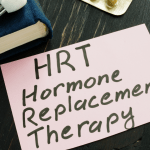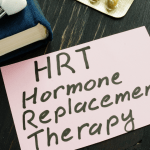Dementia is a progressive neurodegenerative condition that impairs memory, language, problem-solving, and other cognitive functions, significantly affecting daily life. Alzheimer’s disease (AD) is the most common form of dementia, with its incidence doubling every five years after the age of 65. Women are disproportionately affected by Alzheimer’s, with studies suggesting that changes in estrogen levels after menopause may contribute to the increased risk. The prevalence of dementia rises sharply with age, making it a pressing public health concern, especially as the population ages.
The Role of Oestrogen in Women’s Health
Oestrogen plays a crucial role in women’s health, influencing reproductive functions and contributing to the development of secondary sexual characteristics. Beyond its reproductive role, oestrogen has been shown to have neuroprotective effects, potentially safeguarding cognitive function. Observational studies have linked oestrogen therapy (ET) in postmenopausal women to maintained brain tissue integrity and reduced risk of cognitive decline, suggesting that oestrogen may protect cognition by promoting neuron synthesis and reducing inflammation and beta-amyloid deposition, which are hallmarks of Alzheimer’s disease.
Hormone Replacement Therapy (HRT): A Brief History
Hormone Replacement Therapy (HRT) has been used for decades to alleviate menopausal symptoms. Initially, HRT was also considered for chronic disease prevention, including cardiovascular disease and osteoporosis. However, studies like the Women’s Health Initiative raised concerns about the risks associated with HRT, such as increased rates of breast cancer and cardiovascular events, leading to a reevaluation of its use. Despite these concerns, HRT remains a valuable treatment for menopausal symptoms and is now being studied for its potential role in reducing the risk of dementia.
Purpose and Significance of Recent Studies
Recent studies have reignited interest in the potential cognitive benefits of HRT when initiated during or soon after menopause. The “critical window” hypothesis suggests that the timing of HRT initiation may be crucial for its effectiveness in reducing dementia risk. These studies aim to clarify the relationship between HRT and cognitive health, offering hope for new strategies in dementia prevention and highlighting the importance of personalized medicine in addressing the risks and benefits of HRT for individual women.
Understanding the Study on Oestrogen Therapy and Dementia Risk
The meta-analysis in question synthesized data from six clinical trials and 45 observational studies, involving over six million women. Researchers aimed to determine the relationship between oestrogen-based hormone therapy and the risk of developing dementia, particularly Alzheimer’s disease. The studies included women who had taken hormone therapy to treat menopause symptoms and compared their dementia risk to those who had not undergone such treatment. The analysis was particularly focused on the timing of hormone therapy initiation relative to the onset of menopause.
Key Findings on the Impact of Oestrogen Therapy
The meta-analysis revealed significant findings regarding the impact of oestrogen therapy on dementia risk. For women who began oestrogen therapy during midlife or within ten years of menopause, there was a 32% reduction in dementia risk. This suggests a potential protective effect of oestrogen against cognitive decline when therapy is initiated during this critical period.
The Importance of Timing in Hormone Therapy
One of the most crucial aspects highlighted by the study is the importance of timing in hormone therapy. The protective benefits of oestrogen therapy were most pronounced when therapy began in midlife or soon after menopause onset. Conversely, initiating oestrogen therapy after the age of 65 did not confer the same benefits, indicating that the window of opportunity for reducing dementia risk with hormone therapy may close as women age.
Differences in Risk Reduction Between Oestrogen-Only and Combined Therapies
The study also differentiated between oestrogen-only therapy and combined oestrogen-progestogen therapy. While oestrogen-only therapy was associated with a 32% reduction in dementia risk, the addition of progestogen reduced this benefit to a 23% risk reduction. This suggests that progestogens may attenuate the protective effects of oestrogen on the brain. Furthermore, for women who started therapy after age 65, oestrogen-only therapy had neutral effects, and combined therapy was linked to a non-significant increase in risk, particularly with synthetic progestin.
In summary, the meta-analysis underscores the potential of oestrogen therapy to mitigate the risk of dementia when started at the appropriate time during a woman’s life. It also emphasizes the need for further research to understand the complex interplay between hormone therapy components and the timing of their administration.
The Biological Effects of Oestrogen on the Brain
Oestrogen as a Neurotransmitter
Oestrogen is not only a hormone but also acts as a neurotransmitter, influencing the communication between neurons in the brain. It modulates the release and activity of other neurotransmitters such as serotonin, dopamine, and acetylcholine, which are crucial for mood regulation, reward processing, and memory, respectively. The presence of oestrogen receptors in key brain areas, including the hippocampus and prefrontal cortex, underscores its significant role in cognitive functions and emotional responses.
Impact on Glucose Metabolism and Brain Inflammation
Oestrogen has a profound impact on the brain’s energy homeostasis, particularly in glucose metabolism, which is the primary energy source for the brain. It enhances glucose uptake and utilization, ensuring that neurons have adequate energy to function optimally. Additionally, oestrogen exhibits anti-inflammatory properties, reducing the production of pro-inflammatory cytokines and mitigating neuroinflammation, a known contributor to neurodegenerative diseases like Alzheimer’s.
Cell Repair and Neuroprotection
The neuroprotective effects of oestrogen are multifaceted. It promotes the growth and survival of neurons, aids in the repair of damaged neural tissue, and supports the formation of new synapses. Oestrogen also increases the expression of neurotrophic factors, which are vital for neuron maintenance and plasticity. These actions collectively contribute to the resilience of the brain against age-related degeneration and injury.
The Relationship Between Hormone Deprivation and Dementia Risk
Menopause marks the decline of oestrogen production, which has been associated with an increased risk of developing dementia, particularly Alzheimer’s disease. Research indicates that the longer the duration of hormone deprivation, the greater the risk. This suggests a potential window of opportunity for oestrogen therapy; initiating treatment during or soon after menopause may help maintain cognitive health and reduce the likelihood of dementia onset.
In summary, oestrogen’s role as a neurotransmitter, its influence on glucose metabolism and inflammation, its cell repair and neuroprotective capabilities, and the relationship between hormone deprivation and dementia risk highlight the hormone’s integral part in brain health. These biological effects provide a foundation for understanding how oestrogen hormone therapy could potentially mitigate the risk of Alzheimer’s disease when started during the critical period surrounding menopause.
Different Types of Hormone Replacement Therapy
Oestrogen-Only HRT and Its Indications
Oestrogen-only hormone replacement therapy (HRT) is typically prescribed for women who have had their uterus removed, such as after a hysterectomy. This is because oestrogen taken without progesterone can increase the risk of endometrial cancer in women with a uterus. The absence of a uterus eliminates this risk, making oestrogen-only HRT a suitable option. The therapy can help alleviate menopausal symptoms and may also offer protective benefits against osteoporosis and heart disease. However, it’s important to note that oestrogen-only HRT is not appropriate for everyone, regardless if the utereus is still there or not, and should be discussed with a healthcare provider.
Combined Oestrogen-Progestogen Therapy
For women who still have a uterus, combined oestrogen-progestogen therapy is often recommended. The addition of progestogen protects the lining of the uterus from the proliferative effects of oestrogen, thereby reducing the risk of endometrial cancer. This combination therapy can be administered continuously, where both hormones are taken daily, or sequentially, where oestrogen is taken daily and progestogen is added for a portion of the cycle. The choice between these regimens depends on individual factors, including the woman’s stage of menopause and personal preference.
Synthetic vs. Body-Identical Progestogens
When it comes to progestogens used in HRT, there are two main types: synthetic progestogens (progestins) and body-identical (micronized) progesterone. Synthetic progestins are chemically different from the progesterone produced by the body, while micronized progesterone is biologically identical to natural progesterone. Some studies suggest that body-identical progesterone may have a better safety profile and be associated with fewer risks compared to synthetic progestins.
Emerging Alternatives and Precision Hormone Therapy
As research advances, new forms of HRT are being developed to target specific symptoms and reduce potential risks. One such innovation is the selective estrogen receptor modulator (SERM), which can be engineered to target specific organs, such as the brain, without affecting the reproductive system. This precision approach to hormone therapy could potentially offer the benefits of oestrogen without the associated risks of cancer in other tissues. Additionally, transdermal patches and gels are becoming more popular as they bypass the liver and may reduce the risk of certain side effects associated with oral hormones.
In conclusion, the type of HRT a woman may choose to use can vary based on her individual health profile, the presence or absence of a uterus, and personal preferences. It is essential for women to have informed discussions with their healthcare providers to determine the most appropriate type of hormone therapy for their specific needs.
Controversies and Conflicting Evidence in HRT Research
Studies Showing No Protective Effects of HRT
While numerous studies have suggested that hormone replacement therapy (HRT) may confer protective benefits against dementia, particularly Alzheimer’s disease (AD), the evidence is not unequivocal. Several observational studies and clinical trials have reported no significant association between HRT use and reduced risk of AD. For instance, the Women’s Health Initiative Memory Study (WHIMS) found that HRT did not reduce the incidence of dementia or mild cognitive impairment in postmenopausal women. Similarly, research by Lindsay et al. (2002) indicated that HRT neither increased nor decreased the risk of AD. These conflicting results have fueled ongoing debates and highlight the complexity of HRT’s effects on cognitive health.
The Debate Over Synthetic Progestogens
The type of hormones used in HRT, particularly the use of synthetic progestogens, has been a subject of intense debate. Some studies have suggested that synthetic progestogens may negate the potential cognitive benefits of oestrogen. The WHIMS, for example, used a combination of conjugated equine estrogens and medroxyprogesterone acetate, a synthetic progestogen, and found an increased risk of dementia. This has led to questions about whether the adverse outcomes were due to the addition of progestogens or the specific type used. The debate continues as researchers explore the differential effects of synthetic versus bioidentical hormones on cognitive function.
The Need for More Conclusive Research
The inconsistencies in research findings underscore the need for more conclusive studies to determine the true impact of HRT on dementia risk. The current body of evidence comprises studies with varying methodologies, hormone formulations, dosages, and durations of treatment, making it challenging to draw definitive conclusions. Moreover, the potential influence of the timing of HRT initiation relative to menopause onset—often referred to as the “critical window” hypothesis—requires further investigation through well-designed, long-term clinical trials.
Current Gaps in HRT and Dementia Research
Despite the accumulation of data, significant gaps remain in our understanding of the relationship between HRT and dementia risk. Many studies have not adequately accounted for the timing of HRT initiation, the duration of therapy, or the long-term follow-up necessary to observe the development of dementia. Additionally, there is a lack of research focusing on the potential differential effects of HRT in women with varying genetic risk factors for AD, such as the presence of the APOE ε4 allele. Addressing these gaps is crucial for developing clear guidelines for HRT use in the context of dementia risk reduction.

Popular Read
Ongoing Research and Future Directions
Dr. Lisa Mosconi’s Clinical Trial on Midlife Oestrogen Therapy
One of the most promising areas of research in the field of hormone replacement therapy (HRT) and dementia prevention is the work of Dr. Lisa Mosconi and her team. They are conducting a clinical trial focusing on the effects of midlife oestrogen therapy on brain health. This study aims to provide a clearer understanding of how HRT administered during the perimenopausal or early postmenopausal period may influence the risk of developing Alzheimer’s disease. The trial is particularly significant as it explores the “critical window” hypothesis, which suggests that the timing of HRT initiation may be crucial for its effectiveness in neuroprotection.
Investigating Early Biomarkers of Alzheimer’s
Another key area of research is the identification of early biomarkers for Alzheimer’s disease. Detecting the disease in its nascent stages could be pivotal for the timely initiation of interventions such as HRT. Researchers are looking into various biological markers, including genetic profiles, protein levels, and neuroimaging patterns, to predict the onset of Alzheimer’s. Understanding these biomarkers could lead to personalized approaches in administering HRT, potentially enhancing its protective effects against dementia.
The Potential for Precision Hormone Therapy
The concept of precision medicine is gaining traction in the realm of HRT. Precision hormone therapy involves tailoring HRT regimens based on an individual’s specific genetic makeup, hormonal levels, and risk factors for dementia. This personalized approach could optimize the benefits of HRT while minimizing potential risks. Ongoing studies are investigating how different formulations of oestrogen and progestogen, as well as the method of administration, affect cognitive outcomes in postmenopausal women.
The Importance of Longitudinal Studies
Longitudinal studies are essential for understanding the long-term effects of HRT on dementia risk. These studies follow participants over extended periods, allowing researchers to observe the progression of cognitive health and the impact of HRT over time. By tracking changes in brain structure, function, and cognitive performance, longitudinal research provides valuable insights into the potential of HRT as a preventive strategy for Alzheimer’s disease.
In conclusion, the future of HRT research is focused on refining our understanding of its relationship with dementia risk. Through clinical trials, biomarker research, precision therapy approaches, and longitudinal studies, scientists are working towards establishing evidence-based guidelines for the use of HRT in reducing the risk of Alzheimer’s disease. The ultimate goal is to provide women with safe and effective options for preserving cognitive health during and after the transition into menopause.

Conclusion and Recommendations
Summarizing the Potential of HRT in Reducing Dementia Risk
The synthesis of recent research and meta-analyses suggests a promising link between hormone replacement therapy (HRT), specifically oestrogen therapy, and the reduction of dementia risk in women. Studies indicate that initiating oestrogen therapy during midlife or within 10 years of menopause can lead to a significant reduction in the risk of developing Alzheimer’s disease. The potential neuroprotective effects of oestrogen, such as its role as a neurotransmitter, its impact on glucose metabolism, anti-inflammatory properties, and cell repair mechanisms, contribute to this reduced risk. However, it is crucial to note that the timing of therapy initiation plays a pivotal role, with early intervention being key.
Guidelines for Women Considering HRT
- Consult with a healthcare provider to discuss personal health history and the potential benefits and risks of HRT.
- Consider the timing of HRT initiation, ideally starting treatment during midlife or within 10 years of menopause.
- Understand the different types of HRT available, including oestrogen-only and combined oestrogen-progestogen therapies, and choose the one that best fits individual health needs.
- Stay informed about the latest research and guidelines, as the field is continuously evolving.
The Role of Healthcare Providers in HRT Decision-Making
Healthcare providers play a critical role in guiding women through the decision-making process regarding HRT. They should provide comprehensive information on the benefits and risks, help patients understand the importance of timing, and tailor HRT recommendations based on individual risk factors and health profiles. Providers should also stay abreast of the latest research to offer evidence-based advice.
Final Thoughts on the Future of HRT and Dementia Prevention
The relationship between HRT and dementia prevention, particularly Alzheimer’s disease, is an area of active research. While current evidence points to the potential benefits of oestrogen therapy when started early, more conclusive research is needed to fully understand the long-term effects and mechanisms at play. The future of HRT as a preventive strategy for dementia looks promising, with ongoing studies, such as those led by Dr. Lisa Mosconi, aiming to provide more definitive answers. As we await these findings, it is essential for women and healthcare providers to engage in informed discussions about the use of HRT for not only managing menopause symptoms but also potentially reducing the risk of dementia.








